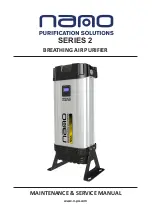
GB
11
3.3 - CONDENSATES
• Both horizontal and vertical units come equipped with a condensate drainage connection.
• On all vertical models, the auxiliary condensate tray (accessory) can be placed underneath the hydraulic connections to
recover condensate water which may form on valves and piping.
• In all cases, the condensate drainage installation must respect certain criteria:
- provide at least a 3 % slope from the fan coil unit,
- install a trap to avoid unpleasant odors,
- do not immerse the end of the drainage tube,
- do not bend the drainage tube.
• As the units are not fitted with a condensate pump, they must be installed
accordingly.
• If a centralized evacuation for several units is used, the system must be fitted
with an air vent to avoid pressurization of the condensate tube and back flow of
condensate toward the units. The diameter of the condensate line must be
calculated with relation to the total output of condensate.
Trap
Slope
Condensate discharge pipe
Immersion
4 - STARTING
4.1 - PRELIMINARY CHECKS
4.1.1 - MAKE SURE
• That the unit is well fixed.
• That the power cables are well fixed to their connection terminals. Loose terminals can cause heat build-up on the
terminal board.
• That the electric cables are properly insulated from any pieces of sheet or metal parts which could damage them.
• That the unit is connected to earth.
• That no tools or any other objects have been left in the unit.
• That the filter is correctly fitted.
• The coil box is clean.
• That the condensate discharge outlet is correctly connected.
• The condensate drain pan is clean.
• Using a bottle, pour water into the condensate recovery tray to ensure that drainage is carried out properly.
• The water connections are positioned correctly and tightened (ensure that the valve kit connections are properly
tightened).
• That the casing is properly reinstalled (for appliances with body panels) and that the access doors are locked if the built-
in control is not installed.
4.1.2 - SWITCH ON THE UNIT
• Using the isolation and protection device.
• Start the appliance by using the control box.
• Make sure that the fan functions correctly at the three fan speeds, without abnormal mechanical noise (two speeds only
for ducted units).
4.1.3 - FILL THE HYDRAULIC CIRCUIT WITH WATER
• If a control valve is assembled, make sure that it is in open position before filling the exchanger.
• Check that all the connections are watertight.
• Proceed with draining the appliances.
4.2 - PURGING THE FAN COIL UNIT
• The air outlet plug and drain plug are located at the level of the water
connections (see drawing opposite).
•
NOTE:
- Never unscrew these plugs by more than 3 mm or three turns.
- Air release: top point of the coil box.
- Drain: low point of the coil box.
IMPORTANT
Before doing any work on the installation, make sure it is switched off and put out of bounds.
max
3 m
m
Positions of the air
release and drain
plugs.
Summary of Contents for TWN Series
Page 13: ...GB 13...
Page 14: ...F GB D I E...


































